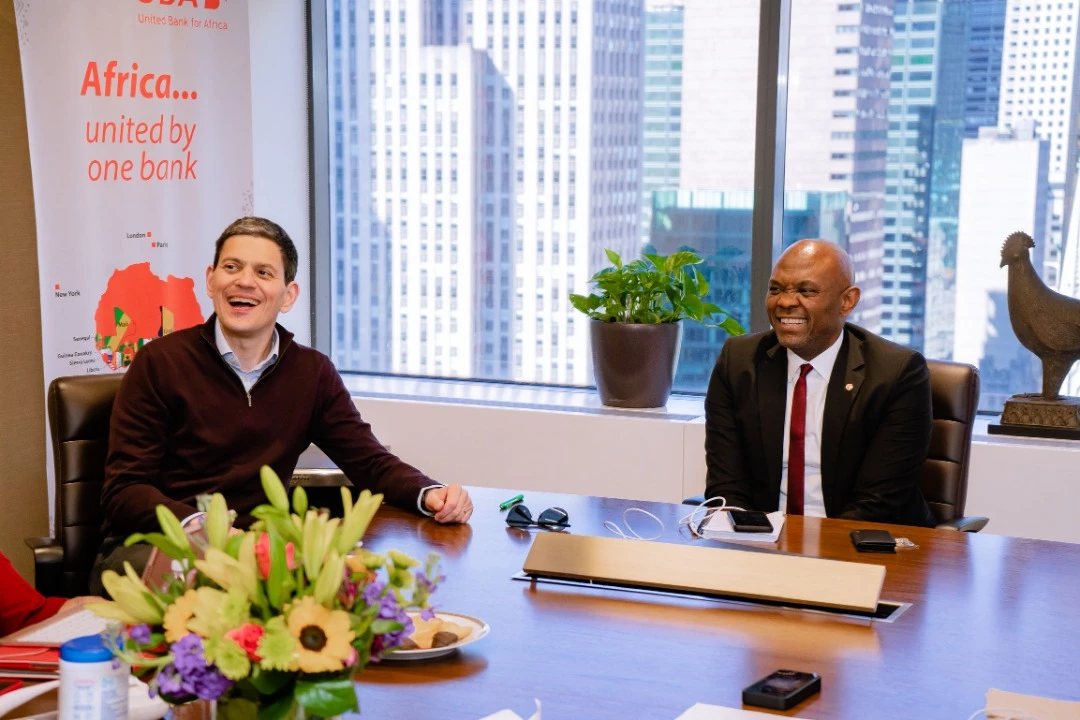Let us be frank. The Africans who bear the harshest effects of the climate crisis are those least responsible for creating this crisis in the first place.
By Tony O. Elumelu, Heirs Holdings Chairman, and David Miliband, President/CEO of the International Rescue Committee.
This month’s COP27 climate negotiations in Egypt were being called “Africa’s COP”, a recognition of the daily impact of the climate crisis on communities across the continent.
The question is whether climate negotiators used this opportunity to address the urgent, immediate needs of African communities around food security, adaptation and access to climate financing.
We are already seeing how the climate crisis is negatively impacting food security and economic livelihoods tied to food production. Africa is home to 60 percent of the world’s agricultural land and the majority of the population are smallholder farmers. While Africa has the potential to be an agricultural powerhouse, the continent’s rain-fed agricultural focus creates unique vulnerability. And as one of the most climate-affected parts of the world, immediate action from the international community is required.
The impending famine in east Africa is a devastating example. Today, the region faces its longest-running drought in 40 years. Thousands of people have already died. As many as 36 million lives are affected, across Ethiopia, Kenya and Somalia. This is a story of political and international failure.
And let us be frank. The Africans who bear the harshest effects of the climate crisis are those least responsible for creating this crisis in the first place. The continent contributed a total of 3.8 percent of global greenhouse gas emissions in 2020. Somalia, at the epicentre of the hunger crisis in east Africa, only contributed 0.002 percent of emissions over the past 250 years.
Following Cop27, it is clear that we need more action on the climate crisis and the inclusion of the world’s most affected in climate solutions.
After the meetings, the impact of climate change on people, livelihoods and communities must remain front and centre. Failure to address climate inequity will result in growing economic disparities for countries in Africa. The continent’s rising debt is expected to reach close to 70 percent GDP, up from 58 percent as of 2019.
The first critical action for world leaders is ensuring these communities have access to climate financing.
Currently, Africa receives less than 4 percent of global climate finance – most of which is made as loans, not grants – and burdens the countries with debt. To bridge the energy inequality that exists between Africa and the rest of the world, the continent must prioritise investments in the provision of traditional and renewable energy for Africans. Green energy transition must allow room for Africa to sustain its economic growth.
Furthermore, for the millions who live with the present effects of extreme weather, major donors must focus on devoting at least 50 percent of the climate finance commitment to adaptation. Climate-resilient agriculture, for example, would help to support rural communities through climate shocks. Progress, transparency and time-bound tracking of climate finance commitments, bringing international finance on adaptation onto an even footing with mitigation, is central to addressing the climate crisis.
Secondly, green entrepreneurship and agripreneurship play critical roles in driving innovative solutions to environmental issues. It is crucial to invest in the people behind these ventures to attain climate equity on the micro level. There are bottom-up solutions that must be pursued.
Local entrepreneurs have the power to affect change through their actions or inactions. To empower and further their focus on sustainability, the Tony Elumelu Foundation mentors and provides $5,000 (£4,200) seed capital towards sustainable businesses across the 54 countries in Africa. More than 1,500 of these entrepreneurs run small businesses addressing environmental issues, in sectors ranging from energy and power generation to waste management.
Over a million Foundation participants are being encouraged to create businesses that incorporate sustainability into their practices. And, to empower youth and grow the demand for and availability of solar power in Ivory Coast, an International Rescue Committee (IRC) programme is building skills and supporting access to employment in the renewable energy sector.
With 22 percent of working-age Africans already starting businesses and contributing to the economic growth of the continent, according to the African Development Bank, these businesses have the power to serve as agents of a sustainable revolution.
Third, to break the cycle of hunger and famine, long-term, flexible programmes that strengthen livelihoods and resilience at the earliest warning signs of drought are needed to prevent, recover and rebuild.
Supported by Google, the IRC is piloting a project in Nigeria that aims to improve smallholder farmers’ ability to weather climate stress and shocks and build sustainable agricultural livelihoods. To achieve this, the IRC is testing the effectiveness of providing advanced cash transfers, triggered by an innovative data platform that predicts climate risks in these communities.
In the Central African Republic, the IRC and partner organisations are implementing a Forest Garden Approach to help vulnerable smallholder farmers to increase their own food security, generate sustainable income and revitalise degraded natural resources.
Investing in resilient livelihoods will not only reduce personal vulnerabilities to climate stress and shocks. It will also foster economic growth in green jobs and greener economies, which holds the potential to mitigate future crises, conflict and migration.
There is no time to wait for climate action in Africa. Too many lives and livelihoods are already at risk in east Africa and beyond to delay bold and visionary investment and leadership any further.
Published by Independent UK
